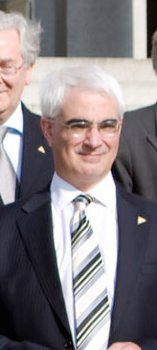Alistair Darling on the Scottish Independence Referendum

Alistair Darling correctly predicted the financial crisis in 2008 and turned to the British public despite the fact that his boss, Gordon Brown was infuriated. In his interview with the Observer that was published on 14th January 2012, Darling spoke about the economic consequences for Scotland if the country would decide to break off from the Union with England, Wales and Northern Ireland. While he made it clear that he is proud on his Scottish roots and that he does not doubt that Scotland could survive as an independent country, he also made it clear why he thinks that it would be best for Scotland to remain an integral part of the United Kingdom at least in the time when the world is dealing with the severest economic crisis in the last 60 years.
Darling explains why he is supporting the Scottish union with the rest of the United Kingdom on the example of the currency question. He points out that Scotland would have three options if it would decided for independence: keep the sterling, adopt the euro or its own currency. And according to Darling, all of three options pose serious financial risks. He explains, that keeping the sterling as currency would simply make no sense and much less worth to bother with independence because the country would still be in an economic union with the rest of the United Kingdom which would be a mini-version of the eurozone. Furthermore, Scotland would not have any say in interest rates if it would have a common currency with a foreign country because the latter would not set the interest rates according to the interest of Scotland. What Darling is trying to say is that breaking off from the union and keeping the pound as currency would undermine an eventual Scottish independence because the country would need to play by the rules set from outside.
Replacement of sterling with euro, on the other hand, would made Scotland a part of the eurozone which is currently faced with a serious crisis. Furthermore, the Scottish interest rates would be set in Frankfurt, while its budget would be monitored by Brussels. According to Darling, this would achieve the opposite of effect of that the proponents of the Scottish independence claim they want to achieve. He also notes, that adoption of euro as a currency would have to be accepted on a referendum which is highly unlikely considering that this currency is just as unpopular in Scotland as it is in England. The last option – adoption of own currency would according to Darling be very risky in today’s uncertain times. He explains that it would simply be impossible to predict its value.
Darling concludes that Scotland is better off it remains in the union with England, Wales and Northern Ireland than going alone. But in a way, he said it all by statement: “There are times when you should gamble and there are times when you shouldn’t.”